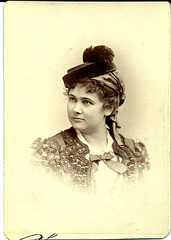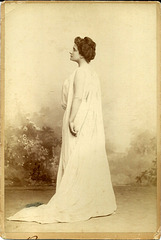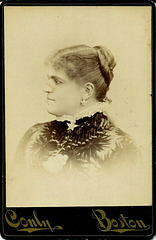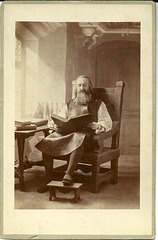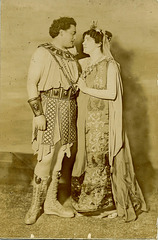
19TH CENTURY OPERA SINGERS
Fritz Feinhals by Gebr Lutzel
| |
|
FRITZ FEINHALS
( b Cologne , 4Dec1869; d Munich , 30Aug1940).
German Baritone
After studies in Italy he made his début in 1895 as Silvio in Pagliacci at Essen, where he remained for two seasons. After a year in Mainz, in 1898 he joined the Munich Opera, where he was last heard in 1927. His Covent Garden début as Telramund won high praise in 1898, but he did not sing there again until Ernest Van Dyck's German season of 1907 when in addition to Telramund his roles were Hans Sachs, Kurwenal, Wolfram and Wotan (Die Walküre). He also appeared in Paris, Vienna, and Rostock, and in 1908–9 at the Metropolitan. There, in addition to the Wagnerian repertory, he sang Amonasro, and Sebastiano in the American première of Eugen D᾽;Albert's Tiefland. In 1917 he sang Borromeo in the world première of Palestrina at Munich, where he later taught. Though W. J. Henderson of the New York Sun wrote of his ‘glorious voice’, recordings made at about this time (1908) make painful listening. The volume is ample but the tone unsteady, the method providing scant evidence of his Italian training.
Nellie Melba by Davis & Sanford
| |
|
as Elizabeth in "Tannhauser" by Wagner
Dame NELLIE MELBA GBE
(Helen Porter Mitchell)
(19 May 1861 – 23 February 1931),
Australian Soprano
Melba was taught to play the piano and first sang in public around age six.She was educated at a local boarding school and then at the Presbyterian Ladies' College. She studied singing with Mary Ellen Christian (a former pupil of Manuel García) and Pietro Cecchi, an Italian tenor, who was a respected teacher in Melbourne. In her teens, Melba continued to perform in amateur concerts in and around Melbourne, and she played the organ at church. Making her professional debut in Melbourne concerts in 1884. On the strength of local success, she travelled to London in search of an opportunity.Her debut at the Princes' Hall in 1886 made little impression, and she sought work unsuccessfully from Sir Arthur Sullivan, Carl Rosa and Augustus Harris.She then went to Paris to study with the leading teacher Mathilde Marchesi, who instantly recognised the young singer's potential: Melba made such rapid progress that she was allowed to sing the "Mad Scene" from Ambroise Thomas's Hamlet at a matinée musicale in Marchesi's house in December the same year, in the presence of the composer.Her talent was so evident that, after less than a year with Marchesi, the impresario Maurice Strakosch gave her a ten-year contract at 1000 francs annually. After she had signed, she received a far better offer of 3000 francs per month from the Théâtre de la Monnaie, Brussels, but Strakosch would not release her and obtained an injunction preventing her from performing .The matter was resolved by Strakosch's sudden death.She made her operatic debut four days later as Gilda in Rigoletto at La Monnaie on 12 October 1887.. It was at this time, on Marchesi's advice, that she adopted the stage name of "Melba", a contraction of the name of her home city.Her Covent Garden début in May 1888, in the title role in Lucia di Lammermoor. She received a friendly but not excited reception The following year, she performed at the Opéra in Paris, in the role of Ophélie in Hamlet; She travelled across Europe to St Petersburg to sing for Tsar Nicholas II: and sang in Paris, Brussels, Vienna , Milan, and Berlin Melba sang the role of Nedda in Pagliacci at Covent Garden in 1893, soon after its Italian premiere. The composer was present, and said that the role had never been so well played before.[19] In December of that year, Melba sang at the Metropolitan Opera in New York for the first time. As at her Covent Garden debut, she appeared as Lucia di Lammermoor, Her Roles included mostly in the lyric soprano repertoire, but with some heavier roles also. She sang the title roles in Herman Bemberg's Elaine and Arthur Goring Thomas's Esmeralda. Her Italian parts included Gilda in Rigoletto, the title role in Aida Desdemona in Otello, Luisa in Mascagni's I Rantzau, Nedda in Pagliacci, Rosina in The Barber of Seville, Violetta in La traviata, and Mimi in La bohème. In the French repertoire, she sang Juliette in Roméo et Juliette, Marguerite in Faust, Marguerite de Valois in Les Huguenots, the title role in Saint-Saëns's Hélène, which was written for her, and Micaëla in Carmen.
Minnie Hauk by Mora (1)
| |
|
Minnie Hauk as Carmen "Carmen " Bizet
MINNIE HAUK
(Amalia Mignon Hauck)
(November 16, 1851 – February 6, 1929),
American Soprano.
In 1862, Hauk began vocal studies with Achille Errani, who secured her a spot with the operatic company of Max Maretzek. At age fourteen she made her debut in Brooklyn as Amina in La sonnambula, and a month later, in November, 1866, her New York City debut as Prascovia in L'étoile du nord. In the American premiere of Gounod's Roméo et Juliette (1867) she sang Juliette. Hauk sang at Covent Garden, London, on 26 October 1868, and debuted in Paris in 1869. The soprano then appeared in Italian and German opera at the Grand Opera in Vienna and other venues throughout Europe. Hauk was the first American Carmen (1878) and Manon (1885). Her voice became a mezzo-soprano of great strength and depth. Hauk's enormous repertory included approximately one hundred roles, and she sang Carmen in four languages.
Lucienne Breval By Benque
| |
|
Lucienne Breval as Valentine 'Le Huguenots" Meyerbeer
LUCIENNE BREVAL
(Bertha Agnès Lisette Schilling)
(4 November 1869, Zürich- 15 August 1935, Neuilly-sur-Seine)
Swiss Soprano
She studied voice with Victor Warot at the Paris Conservatoire before making her debut at the Opéra National de Paris in 1892 as Selika in l'Africaine by Giacomo Meyerbeer .Bréval became a principal soprano at the Paris Opéra and remained there until 1919.[3] Her roles with the company included several world premières including Augusta Holmès's La Montagne Noire (1895), Camille Erlanger's Le fils de l' étoile' (1904), Dukas’ Ariane et Barbe-bleue (1907), Massenet's Bacchus (1909), and the title roles in Massenet's Ariane (1906) and Henry Février’s Monna Vanna (1909). She also was Kundry in France's first performance of Wagner's Parsifal (1914). Her other notable roles at the Paris Opera included Brünnhilde in Richard Wagner's Die Walküre (1893), Venus in Wagner's Tannhäuser (1895), Marguerite in Hector Berlioz's La damnation de Faust (1897), and the title role in Rameau's Hippolyte et Aricie (1908).
Bréval also occasionally appeared in productions at the Opéra-Comique in Paris. Most notably she portrayed the title role in the world premiere of Massenet’s Grisélidis in 1901, and in 1910 she sang Lady Macbeth in the première of Ernst Bloch’s Macbeth, which he dedicated to her.
In 1899, Bréval made her first appearance at the Royal Opera, Covent Garden as Valentine in Meyerbeer's Les Huguenots. Two years later she made her American début at the Metropolitan Opera as Chimène in Le Cid, singing also in Die Walküre and the American première of Ernest Reyer’s Salammbô. Five years later she returned to Covent Garden for the second and last time in the title role of Gluck’s Armide. In 1913 she created the title role in Fauré’s Pénélope at the Opéra de Monte-Carlo; her other title roles there had been in Isidore De Lara's Amy Robsart and in Bizet's Carmen
Maurice Renaud by Benque
| |
|
Maurice Renaud as Wolfram "Tannhauser" Wagner
RENAUD Maurice (Maurice CRONEAU ). — BaritonE (Bordeaux, 24 July 1862 – Paris, 16 October 1933).
Début 17 July 1891 in L'AFRICAINE (Nélusko). 1891, LES HUGUENOTS (Nevers), LA FAVORITE (Alphonse), SIGURD (Gunther, The Priest in 1896) ; 1892, FAUST (Valentin), GUILLAUME TELL (Leuthold, then Guillaume), AÏDA (Amonasro), LE SICILIEN (Tircis), OTHELLO (Iago) ; then SAMSON ET DALILA (Grand Priest 1893), TANNHÄUSER (Wolfram 1895) ; HAMLET (Hamlet), DON JUAN (Don Juan) in 1896 ; RIGOLETTO (Rigoletto), THAÏS (Athanaël) 1908 ; APOTHEOSE DE BEETHOVEN (Teltscher), HENRY VIII (Henry VIII) 1909 ; LA DAMNATION DE FAUST (Méphistophélès, 1910), LE VIEIL AIGLE ( Khan, 1914), MONSIEUR CHOUFLEURI RESTERA CHEZ LUI LE... (Fetermann, 1919). Creator in LOHENGRIN ( Telramund), SALAMMBO (Hamilcar), LA VIE DU POETE, RHEINGOLD (Albérich), DEIDAMIE (Ulysse), GWENDOLINE (Harald), DJELMA (Raim), LA MONTAGNE NOIRE (Aslar), FREDEGONDE (Hilpérik), MESSIDOR (le Berger), LES MAÎTRES CHANTEURS DE NUREMBERG (Beckmesser), LA PRISE DE TROIE (Chorèbe), LANCELOT (Arthus . He created at the Nouveau-Théâtre on April 26, 1906 the Clown (Auguste) of Isaac de Camondo
Sofia Scalchi by Conly
| |
|
SOFIA SCALCHI
(November 29, 1850 – August 22, 1922)
Italian Contralto/Mezzo
Studied voice with Augusta Boccabadati. In 1866, she made her stage debut in Mantua as Ulrica in Giuseppe Verdi's " Un Ballo in Maschera ".
At the Royal Opera House, Covent Garden, on November 5, 1868, she made her London debut as Azucena in "Il trovatore," also by Verdi. She appeared with the Covent Garden company thereafter until 1890, performing most of the standard lower-pitched female operatic roles. These included Urbain, Amneris and Arsarce, among others. Meanwhile, in 1882-83, she toured the United States for the first time, singing on that occasion with Mapleson's company. She did, however, take part in a number of important American premieres, including those of Verdi's last two masterpieces, Otello and Falstaff. She appeared, too, in the initial American productions of Amilcare Ponchielli's La Gioconda and Umberto Giordano's Andrea Chénier.
Albert Vaguet by Benque
| |
|
Albert Vaguet as David 'Die Meistersinger von Nurnberg" Wagner
ALBERT VAGUET
( b.15 June 1865 - Elbeuf (Seine-Maritime) d. 22 February 1943 at Pau)
French Tenor
He studied at the Paris Conservatoire under Barbot, Obin and Ponchard. In 1890 he debuted at the Grand Opéra in Paris as Faust in Gounod’s ‘’Faust’’. During his whole career he remained a member of this opera house. Here in 1897 he sang at the premiere of as David in Wagner’s ‘’Meistersingers’’, in 1894 Cassio in Verdi’s ‘’Otello’’, in 1899 Hylas in the première of the opera ‘’Briseïs’’ of Chabrier, in 1901 Marcomir in ‘’Les barbares’’ of Saint-Saëns, in 1899 sang the title role in ‘’Joseph’’ of Méhul. In 1893 he appeared (as well as his wife) in the premiere of the opera ‘’Deïdamie’’ of Henri Maréchal. In 1895 he sang at the Grand Opéra in ‘’Tannhäuser’’ after the debacle of the première in 1861. In 1900 he sang in the premiere of the opera ‘’Lancelot’’ of F. L. R. Joncières. He was married to the soprano Alba Chrétien-Vaguet, he lost a leg in a accident in 1903 which ended his career as an opera singer suddenly. Then he performed as a concert singer
Jean Francois Delmas by Bary
| |
|
Jean Francois Delmas as Hans Sachs "Die Meistersinger von Nurnberg" Wagner
JEAN FRANCIS DELMAS
Lyon, April 14, 1861-73.Saint - Alban-de-Monthel, 29 September 1933). French Bass
Debut September 28, 1886 in LES HUGUENOTS (Saint-Bris). Sings the FREISCHÜTZ (Gaspard, 1886), AIDA (the King), FAUST (Mephistopheles) in 1887. DON JUAN (Leporello, 1887; don Juan, 1902), SIGURD (Hagen, 1891), William TELL (Gessler), the Sicilian (Connie) in 1892. OTHELLO (Iago, 1894), TANNHÄUSER (Landgrave, 1895); Romeo and Juliet (brother Laurent), fatherland! (de Rysoor), LE CID (don Diego), ALCESTE (high priest) in 1900; HENRY VIII (Henry VIII, 1903), ARMIDE (Hidraot, 1905), the DAMNATION of FAUST (Mephistopheles, 1906), SAMSON ET DALILA (high priest), HIPPOLYTE and ARICIE (Thésée) in 1908. ŒDIPE A column (Oedipus),. BRISEIS (Strakokles) in 1916. Is the creator of LA DAME DE MONSOREAU (Monsoreau), ROMEO ET JULIETTE (Capulet), ZAIRE (Jeanette); on March 16, 1891 LE MAGE (Amrou) de Jules Massenet LOHENGRIN (King), SALAMMBÔ (Nar-Havas), die WALKÜRE (Wotan). on March 16, 1894 THAÏS (Athanaël) by Jules Massenet; HELLE (Gautier), MESSIDOR (Mathias),LES MAITRES CHANTEURS DE NUREMBERG (Hans Sachs), BURGONE (Attila), JOSEPH (Jacob), ASTARTE (Phur); on April 26, 1901LE ROI DE PARIS (Henri, Duke of Guise) of Georges Hüe. THE LES BARBARES (Scaurus), SIEGFRIED (Wotan), ORSOLA (Bishop), bench (Tonio),LA STATUE (Arnigiad), L’ETRANGER (l'Etranger), LE FILS DE L'l'ETOILE (Akiba), TRISTAN & ISOLDE (Kurwenal), DARIA (Yvan),LA GLOIRE DE CORNEILLE (Auguste), ARIANE (Parithoils), LA CATALANE (Miguel), Twilight of the gods (Hagen), MONNA VANNA (Marco), RHEINGOLD (Wotan), LA Forêt (Pierre), ICARE (Daedalus), ROMA (Fabius), FERVAAL (Arfagard), PARSIFAL (Gurnemanz), L'OURAGAN (Gervais), La Roman le ESTELLE (Rubini), La GIRONDINS (Fonfrède), JEANNE d'Arc (Jacques d'Arc), INTERMEDE (Pierre Dupont), La Legende of SAINT Christoph (the hermit), ANTAR (Malek), LA FILLE DE ROLAND (Charlemagne), LES BURGRAVES (the beggar).
Participated in the first performance
December 24, 1923 of ESCLARMONDE (Emperor Phorcas) by Jules Massenet. He created at the Nouveau-Théâtre 26 April 1906 le Clown (Barbazan) of Isaac de Camondo.
Marguerite (Zina)de Nuovina by Benque
| |
|
de Nuovina as Carmen "Carmen" Bizet
MARGUERITE ZINA DE NOUVINA
(Marguerite Lamandi nee Moldave)
1865-1936
Romanian Mezzo
Debut on November 27, 1889 - premiere of Esclarmonde in Théâtre Royal de la Monnaie in Brussels - Debut at the Opera Comique 24/3/1893 by creating Kassya "Kassya" .From 1900 sang Carmen "Carmen" , Santuzza "Cavaleria Rusticana" , Anita 'La Navarraine" and Charlotte "Werther"
Performed in Paris and Berlin. Successes in leading roles in "Amida" by Gluck, "Lohengrin" by Wagner, In Bucharest, sang in shows Stephănescu, which aimed to raise funds for the establishment of Romanian Opera.
Marguerite (Zina) de Nuovina by Benque
| |
|
de Nuovina as Carmen "Carmen" Bizet
MARGUERITE ZINA DE NOUVINA
(Marguerite Lamandi nee Moldave)
1865-1936
Romanian Mezzo
Debut on November 27, 1889 - premiere of Esclarmonde in Théâtre Royal de la Monnaie in Brussels - Debut at the Opera Comique 24/3/1893 by creating Kassya "Kassya" .From 1900 sang Carmen "Carmen" , Santuzza "Cavaleria Rusticana" , Anita 'La Navarraine" and Charlotte "Werther".
Performed in Paris and Berlin. Successes in leading roles in "Amida" by Gluck, "Lohengrin" by Wagner, In Bucharest, sang in shows Stephănescu, which aimed to raise funds for the establishment of Romanian Opera.
Albert Alvarez & Louise Grandjean by Benque
| |
|
Albert Alvarez as Hercules & Louise Grandjean as Delanira in 'Astarte" Leroux
CREATOR ROLES
LOUISE GRANDJEAN
(1870–1934)
French Soprano
Studied at the Paris Conservatory before making her professional opera debut in 1893 at the Opéra Comique as Isabella in Le Pré aux clercs.She was Alice Ford in France's first production of Verdi's Falstaff in 1894. she appeared in world premieres of Xavier Leroux's Astarté (1901), Jules Massenet's Ariane (1906), and Fernand Le Borne's La Catalane (1907In Monte Carlo she sang in the premieres of Eugène d'Harcourt's Le Tasse (1903) and Alfred Bruneau's Naïs Micoulin (1907) among other roles.
ALBERT ALVAREZ
(Albert Raymond Gourron)
( May 16, 1861 - February 26, 1933)
French Tenor
Debut in Faust (Faust) March 14, 1892 at the Opéra de Paris , He sang Romeo and Juliet (Romeo, 1892); Lohengrin (Lohengrin, 1892); Samson and Delilah (Samson, 1893); the Valkyrie (Siegmund, 1893); Tannhäuser (Tannhäuser, 1895); Aida (Radames, 1895); the Favorite (Fernand, 1896); Sigurd (Sigurd, 1896); the Huguenots (Raoul, 1897); the Prophet (John, 1898); Fatherland! (Kerloo, 1900); The Cid (Rodrigue, 1900); Othello (Othello, 1903); Il Trovatore (Manrique, 1904); Pagliacci (Canio, 1906); Salammbô (Matho, 1906). He sang in the premiere at the Opera, November 10, 1897, the masters singers of Nuremberg (Walther) Richard Wagner [French version of Alfred Ernst]; December 11, 1904, Tristan and Isolde (Tristan) by Richard Wagner [French version of Alfred Ernst].
He created on 16 March 1894 Thaïs (Nicias) by Jules Massenet; February 08, 1895 the Black Mountain (Mirko) of Augusta Holmès; on December 18, 1895 Frédégonde (Merowig) to Ernest Guiraud; on April 24, 1896, Helle (Jean) of Alphonse Duvernoy. February 19, 1897 Messidor (Guillaume) of Alfred Bruneau; December 23, 1898 the Burgundian (Gauthier) of Paul Vidal; February 15, 1901 Astarte (Hercule) Xavier Leroux; on April 17, 1904, the son of Camille Erlanger Star (Bar-Kokeba
Zulma Bouffar by Reutlinger
| |
|
ZULMA BOUFFAR
(Zulma Madeleine Boufflar)
(24 May 1841 - 20 January 1909)
French Soprano
Offenbach, who heard her sing in Hamburg in 1864. The same year Bouffar appeared at Bad Ems in Offenbach's Lischen et Fritzchen, and repeated her success in Paris.She created Nani in Les géorgiennes, Jeannet in Les bergers, Gabrielle in La vie Parisienne, Drogan in Geneviève de Brabant, Toto in Le château à Toto, Fragoletto in Les Brigands, Robin Luron in Le Roi Carotte, Ginetta in Les braconniers, Moschetta in Il signor Fagotto and Prince Caprice in Le voyage dans la lune – a range of men's and women's roles.
In 1873 Bouffar was reported in the Parisian press to have been considered for the title role of Bizet's new opera, Carmen. Although the composer refuted the story, the singer did attend the premiere of the piece in 1875.
From 1891-93 Bouffar became the manager of the Théâtre de l'Ambigu-Comique. In the latter part of her stage career, Bouffar appeared in operettas by Lecocq and Strauss, and sang around Europe. She announced her retirement from the stage in 1902.
Antonie Link by Krziwanek
| |
|
Antonie Link as Wladimir Dimitrowitsch Samoiloff, (Lieutenant of a Circassian Cavalry Regiment)
in Fatinitza by Franz von Suppé. CREATOR ROLE
ANTONIE LINK
(14 Feb 1855-21 May 1931)
Hungarian Mezzo Soprano
She attended the Conservatory of Budapest . Studied voice with Mme Laroche in Vienna and was in the chorus at the Court opera and sang some small roles.She was hired as an operetta singer by the Director of Vienna's Carl-theatre .She performed together with the great diva Marie Geistinger in Offenbach's "Beautiful Helena" as Ganymede. She appeared in the operetta "Fatinitza" (01/05/1876) and "Boccaccio" (02.01.1879 namely in the title role, which was later sung by a tenor) with. On 03.01.1877 she performed in the premiere of Johann Strauss operetta on "Prince Methuselah". In 1874 she created at the Carl-Theater in Vienna, the operetta "La fille de Madame Angot" by Lecocq., She toured Australia in 1879 with the Montague-Turner opera Company
Mario by Caldesi Blanford & Co
| |
|
GIOVANNI MARIO
(Giovanni Matteo, marquis of CANDIA ). -Italian tenor (Cagliari, October 17, 1810 – December 11, 1883).
Husband Giulia Grisi. He debuted under the name of Mario on 02 December 1838 in ROBERT LE DIABLE de Meyerbeer (Robert). He sang LE COMTE ORY Rossini. THE Draper of Halévy; THE HUGUENOTS (Raoul, 1862).
"This famous tenor of the Italians, and a moment of the Opera, was the son of the Italian general marquis of Candia." When starting at the Opera that he took the name of Mario, he was both exemplified since. After a long time living with the famous singer Giulia Grisi, who died in 1869, he eventually married her, when she became the widow of her first husband. They had six children .
Ernestine Schumann-Heink by Aime Dupont
| |
|
|
ERNESTINE SCHUMANN-HEINK
(Ernestine "Tini" Rössler )
(15 June 1861 – 17 November 1936),
German/American Contralto
At age 15 sang soprano in a performance of Beethoven's 9th Symphony at Graz . in 1878 made her stage debut as Azucena at Dresden. Engaged in 1882 at Hamburg ,she sang a wide variety of roles . ranging from Amneris, Orpheo ,Orsini , Ulrica , Bertyha , Quickly . She never ventured into the soprano range , She made guest appearances at London and Berlin .She sang " The Ring " at BayreuthShe went to the Usa in 1898 and was Ortrud at Chicargo , Made her Metropolitan debut 1899 in the same role.Her final appearance at the Met was 1932 singing Erda'
Mariya Slavina by Photography of Imperial Theatres…
| |
|
Mariya Slavina
1858–1951
Russian Mezzo Soprano.
Soloist at the Mariinsky Theatre in 1879-1917 (debut as Amneris in “Aida”). Created Hanna in "the may night" by Rimsky-Korsakov (1880) at the Marinsky, Princess in "The Enchantress" by Tchaikovsky (1887) at St Petersburg , Countess in 'Queen of Spades" Tchaikovsky (1890) at St Petersburg ,Clytemnestra in 'Oresteia" Taneyev (1895) at the Marinsky, First performance on the Russian stage as Carmen 1885 , Fricke in 'Valkyrie" 1900 , Clytemnestra in 'Electra" . Among her best roles Olga 'Eugene Onegin" , Seibel in 'Faust" , Fides in "The Prophet" After her marriage she was known as Baroness Mariia Aleksandrovna Medem
Antonia Nezhdanova by Photography of Imperial Thea…
| |
|
Antonina Vasilievna Nezhdanova
1873 –1950
Russian Soprano.
In 1899, she entered the Moscow Conservatory and studied with Rubinstein and Masetti ,Debut 1902 as Antonida in “ Life of the Tsar” by Glinka at Moscow. She joined the Bolshoi Theatre, rapidly becoming its leading soprano. She often sang, too, at the Mariinsky Theatre in St Petersburg and also in Kiev .Monte Carlo and Odessa. Paris heard her in 1912, when she Gilda “Rigoletto” Verdi .She was also an qvid recitalist and introduced works by Arensky , Rimsky Korsakoff , Rachmaniov and Scriabin .Her roles include Julieete ‘Romeo et Julitte” Gounod ,Rosina ‘Barber of Saville” Rossini.Tatyana ‘Eugene Onegin” Tchaikovsky , Queen of the Night “Magic Flute” Mozart , Tosca ‘Tosca” Puccini , Elsa “Lohengrin “ Wagner and Tamara ‘The Demon” Rubenstein
Marinsky Opera by Photography of Imperial Theatres…
Jump to top
RSS feed- Latest items - Subscribe to the latest items added to this album
- ipernity © 2007-2025
- Help & Contact
|
Club news
|
About ipernity
|
History |
ipernity Club & Prices |
Guide of good conduct
Donate | Group guidelines | Privacy policy | Terms of use | Statutes | In memoria -
Facebook
Twitter



